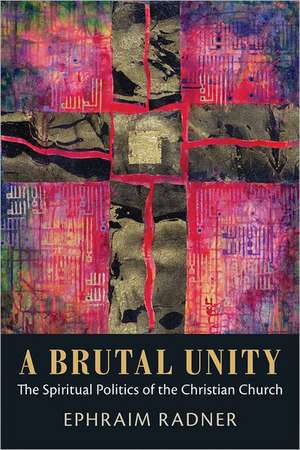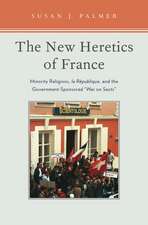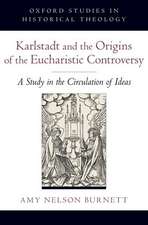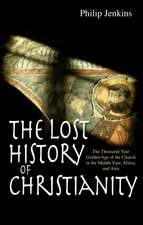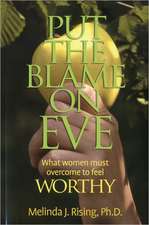A Brutal Unity: The Spiritual Politics of the Christian Church
Autor Ephraim Radneren Limba Engleză Hardback – 14 oct 2012
Preț: 445.63 lei
Nou
Puncte Express: 668
Preț estimativ în valută:
85.27€ • 89.27$ • 70.56£
85.27€ • 89.27$ • 70.56£
Carte disponibilă
Livrare economică 17-31 martie
Preluare comenzi: 021 569.72.76
Specificații
ISBN-13: 9781602586291
ISBN-10: 1602586292
Pagini: 488
Dimensiuni: 152 x 228 x 36 mm
Greutate: 0.82 kg
Editura: Baylor University Press
Colecția Baylor University Press (US)
ISBN-10: 1602586292
Pagini: 488
Dimensiuni: 152 x 228 x 36 mm
Greutate: 0.82 kg
Editura: Baylor University Press
Colecția Baylor University Press (US)
Recenzii
"Radner's A Brutal Unity is at a book of startling insight, extraordinary erudition, and is replete with theological implications. His ability to help us see connections between Christian disunity and liberal political theory and practice should command the attention of Christian and non-Christian alike. A Brutal Unity is a stunning achievement." --Stanley Hauerwas, Gilbert T. Rowe Professor of Theological Ethics, Duke Divinity School
"Massively learned and beautifully written, this book has to be the best work ever written against the holiness and unity of the Church by a Christian theologian. Not one to mince words, Radner presents Judas as the mirror of the faithless, violent, and fractured Church. For Radner, the failure of liberalism arises from and reflects the failure of the Church to repent. But he does not end here: he argues that in God's creation of things separate from God, and in Christ's radical giving of himself, we find God's holiness and oneness as a gift for God's people and as an invitation to imitate God's asymmetrical giving. Those who disagree with Radner will thank him for pressing us to examine anew why Christians rightly confess the Church to be one and holy." --Matthew Levering, University of Dayton
"Massively learned and beautifully written, this book has to be the best work ever written against the holiness and unity of the Church by a Christian theologian. Not one to mince words, Radner presents Judas as the mirror of the faithless, violent, and fractured Church. For Radner, the failure of liberalism arises from and reflects the failure of the Church to repent. But he does not end here: he argues that in God's creation of things separate from God, and in Christ's radical giving of himself, we find God's holiness and oneness as a gift for God's people and as an invitation to imitate God's asymmetrical giving. Those who disagree with Radner will thank him for pressing us to examine anew why Christians rightly confess the Church to be one and holy." --Matthew Levering, University of Dayton
Cuprins
Introduction 1. Religious Violence and Christian Blasphemy Postscript: The Tears of Peter 2. Division Is Murder Postscript: Judas the Apostle 3. The Sins of the Church Postscript: Loving Jerusalem 4. The Conciliar Ideal Postscript: The Way Together 5. The Limits of Consensus Postscript: The First Council 6. The Procedural Quest for Unity and Its Obstacles Postscript: The Prophetic Contest 7. Conscience and Its Limits Postscript: The Crucifixion of Conscience 8. Multiple Consciences and the Rise of Solidarity Postscript: A Figural Phenomenology of the Church 9. The Unity of Sacrifice Conclusion
